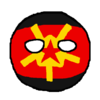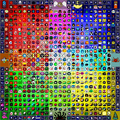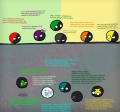 |
Work in Progress "Workers of the world, unite! Separately, in your own homes.!" - Asocialism HelloThere314 is currently working on this page. Please do not intervene with their work. Instead, contact them to propose additional edits. |
Meta-Anarchism, also known as Deleuzoguattarianism, is a philosophical and political ideology that focuses on an analysis of different social structures based upon ideas such as machines, territories, war machines, etc. It analyzes these structures from a ![]() Post-Structuralist and a
Post-Structuralist and a ![]() Post-Modernist perspective, rejecting any fundamental principle for its ideas, instead relying on what Deleuze and Guattari call
Post-Modernist perspective, rejecting any fundamental principle for its ideas, instead relying on what Deleuze and Guattari call ![]() Pragmatics. Their political ideas are broadly based upon
Pragmatics. Their political ideas are broadly based upon ![]() Post-Left ideas arising after may 68.
Post-Left ideas arising after may 68.
History
Before The Collaboration
Before meeting each other and collaborating, ![]() Deleuze and
Deleuze and ![]() Guattari had their own personal projects and works. Deleuze taught at the University of Paris and published his first work, Empiricism and Subjectivity, a work on the theories of Hume. After his time there he worked at the French National Center for Scientific Research, during which he wrote Nietzsche and Philosphy, his own personal anti-Hegelian reading of
Guattari had their own personal projects and works. Deleuze taught at the University of Paris and published his first work, Empiricism and Subjectivity, a work on the theories of Hume. After his time there he worked at the French National Center for Scientific Research, during which he wrote Nietzsche and Philosphy, his own personal anti-Hegelian reading of ![]() Nietzsche. It was also during his time there that he befriended fellow post-structuralist philosopher
Nietzsche. It was also during his time there that he befriended fellow post-structuralist philosopher ![]() Michel Foucault. He then taught at the University of Lyon. During this time the events of may 68' occurred, in which he defended his dissertations by writing two works: Difference and Repetition and Expressionism in Philosophy. He then began teaching at the University of Paris VIII, where he would befriend Guattari.
Michel Foucault. He then taught at the University of Lyon. During this time the events of may 68' occurred, in which he defended his dissertations by writing two works: Difference and Repetition and Expressionism in Philosophy. He then began teaching at the University of Paris VIII, where he would befriend Guattari.
Guattari became interested in politics and philosophy through his participation in ![]() Trotskyist groups as a teenager. He then worked directly under famous psychoanalyst
Trotskyist groups as a teenager. He then worked directly under famous psychoanalyst ![]() Jacques Lacan, who he would later be very critical of. After this he worked at La Borde, an experimental clinic that would greatly influence his later idea of schizoanalysis through their experimental use of group therapy. His earlier Marxist views still influenced him greatly, as he would support anti-colonial struggles and the Italian
Jacques Lacan, who he would later be very critical of. After this he worked at La Borde, an experimental clinic that would greatly influence his later idea of schizoanalysis through their experimental use of group therapy. His earlier Marxist views still influenced him greatly, as he would support anti-colonial struggles and the Italian ![]() Autonomists. He then founded, along with many other militants, The Federation of Groups for Institutional Study & Research, which engaged in anti-colonial struggle and anti-psychiatry. Guattari was involved in the may 68' movements, the failure of which influencing him and many others thought. After this he met Deleuze and begun planning Anti-Oedipus together.
Autonomists. He then founded, along with many other militants, The Federation of Groups for Institutional Study & Research, which engaged in anti-colonial struggle and anti-psychiatry. Guattari was involved in the may 68' movements, the failure of which influencing him and many others thought. After this he met Deleuze and begun planning Anti-Oedipus together.
Deleuze And Guattari's Collaboration
Deleuze and Guattari collaborated on 3 works: Capitalism and Schizophrenia, Kafka: Towards a Minor Literature, and What is Philosophy? These works describe the foundations of schizoanalysis and other shared ideas, though they where expanded individually by Deleuze and Guattari respectively. Their most famous work was Capitalism and Schizophrenia, was an attack upon traditional psychological practice and its dogma. Their attitudes in this work became synonymous with post-structuralism and post-modernism, with them emphasizing the nomadology of knowledge and identity. This work was split into two volumes, those being: Anti-Oedipus and A Thousand Plateaus. Anti-Oedipus is the fundamental text of schizoanalysis, constructing its practice out of a criticism of classical psychoanalysis. They also recontextualize ![]() Marx's dialectical materialism into desiring production. Nietzsche's will to power is very influential to how Deleuze and Guattari describe desiring production. A Thousand Plateaus puts both the ideas arising out of Anti-Oedipus and the new idea of the rhizome into praxis. The rhizome is a group of machines that are connected in the sense that none are prioritized over the other and that a connection is always in the middle, there is no start or end. They use both the basis of schizoanalysis and a rhizomatic way of thinking to analyze various things such as sexuality, linguistics, war machines, etc.
Marx's dialectical materialism into desiring production. Nietzsche's will to power is very influential to how Deleuze and Guattari describe desiring production. A Thousand Plateaus puts both the ideas arising out of Anti-Oedipus and the new idea of the rhizome into praxis. The rhizome is a group of machines that are connected in the sense that none are prioritized over the other and that a connection is always in the middle, there is no start or end. They use both the basis of schizoanalysis and a rhizomatic way of thinking to analyze various things such as sexuality, linguistics, war machines, etc.
Kafka: Towards a Minor Literature came to being out of Deleuze and Guattari's shared distaste towards the current interpritations and analysis of ![]() Kafka's literature. Throughout this text they attack many narratives given by analysts to Kafka: such as the oedipalization of his work, placing him in mother father narratives. They also critique the placement of theology in Kafka as above all other things that can be drawn out of him, such as his existentialist and anarchist political and personal ideas. This mode of thinking is what they call major literature, a mode of analysis that relies on socially constructed narratives and concepts. While the topic of the text is literature, they extend this major categorization to philosophy, attacking thinkers such as
Kafka's literature. Throughout this text they attack many narratives given by analysts to Kafka: such as the oedipalization of his work, placing him in mother father narratives. They also critique the placement of theology in Kafka as above all other things that can be drawn out of him, such as his existentialist and anarchist political and personal ideas. This mode of thinking is what they call major literature, a mode of analysis that relies on socially constructed narratives and concepts. While the topic of the text is literature, they extend this major categorization to philosophy, attacking thinkers such as ![]() Descartes,
Descartes, ![]() Kant,
Kant, ![]() Hegel, etc. Along with this they offered their own analysis of Kafka based on both their philosophy of schizoanalysis and their philosophy of flux. They analyze without care for narratives, genere's, etc that find themselves at the crux of major analysis. Instead, they see Kafka's work as the start of the project of minor literature, a mode of analysis without the essentialism or reliance on socially constructed concepts. This is extended, just as it was with major philosophy, to the idea of minor philosophy, which they identify with thinkers such as
Hegel, etc. Along with this they offered their own analysis of Kafka based on both their philosophy of schizoanalysis and their philosophy of flux. They analyze without care for narratives, genere's, etc that find themselves at the crux of major analysis. Instead, they see Kafka's work as the start of the project of minor literature, a mode of analysis without the essentialism or reliance on socially constructed concepts. This is extended, just as it was with major philosophy, to the idea of minor philosophy, which they identify with thinkers such as ![]() Spinoza, Nietzsche, and of course, themselves. Minor philosophy is philosophy that doesn't rely on crude reliance on set logic systems, but relies on ideas that are more rhizomatic.
Spinoza, Nietzsche, and of course, themselves. Minor philosophy is philosophy that doesn't rely on crude reliance on set logic systems, but relies on ideas that are more rhizomatic.
What is Philosophy? describes Deleuze and Guattari's notion of what philosophy is and what separates it from other subjects. While others have defined philosophy as simply thinking about big, more abstract, problems, Deleuze and Guattari define philosophy as the discipline in the business of creating concepts. This concept creation comes about whenever it is useful, for example, when Kant needed a concept to describe what he saw as a priori truths he invented the conept of the thing in itself. While this is a very simple definition to give to philosophy, Deleuze and Guattari go into the small details of how philosophy occurs and how it differentiates it from things such as art or science. The creation of concepts is based in a concept Deleuze and Guattari call the plane of immanence, a basis for which everything comes into being. This plane of immanence is not a concept itself, but is instead closer to something resembling ![]() Stirner's creative nothing, it holds no attributes yet creates in its process. The plane of immanence is characterized, as the name implies, by immanence. Immanence is the opposite of transcendence, meaning the state of being entirely within something. From the plane of immanence, concept creation and philosophy are engaged in. This creation is creative in the eyes of Deleuze and Guattari, comparing the process to the process of the artist.
Stirner's creative nothing, it holds no attributes yet creates in its process. The plane of immanence is characterized, as the name implies, by immanence. Immanence is the opposite of transcendence, meaning the state of being entirely within something. From the plane of immanence, concept creation and philosophy are engaged in. This creation is creative in the eyes of Deleuze and Guattari, comparing the process to the process of the artist.
These works are the three works that Deleuze and Guattari collaborated on together, but their theories remained intertwined throughout their lives. Each worked to expand schizoanalysis in their own way, while engaging in their own projects. Deleuze expanded his metaphysics in works such as Spinoza: Practical Philosophy, while Guattari expanded his ![]() Post-Marxist theories in works such as Molecular Revolutions and worked in the realm of ecology. Both were hugely influential to all of modern continental philosophy, especially other post-structuralists.
Post-Marxist theories in works such as Molecular Revolutions and worked in the realm of ecology. Both were hugely influential to all of modern continental philosophy, especially other post-structuralists.
After Deleuze And Guattari
Beliefs
Tenets
Fascism And Self Repression
Machinic Analysis Of Capital
The Statist Co-option Of The War Machine
Deteritorialization And Proto-Accelerationism
The Freeing Of Desire
Molecular Revolutions
Variants
Sub-Ideologies
 Deleuzianism
Deleuzianism
 Guattarism
Guattarism
Schools Of Thought
 Dark Deleuzianism
Dark Deleuzianism
Personality
How to Draw
- draw a ball
- make the background white
- draw a few variously colored dots inside the ball
- draw the eyes and you're done!
| Color Name | HEX | RGB | |
|---|---|---|---|
| White | #FFFFFF | 255, 255, 255 | |
| Decrepit blue | #9BCED9 | 155, 206, 217 | |
| cyan | #76CFEA | 118, 207, 234 | |
| light blue | #44CFF3 | 68, 207, 243 | |
| death worship green | #C0E88B | 192, 232, 139 | |
| almost violet | #b1ACE8 | 177, 172, 232 | |
| red? | #EF9993 | 239, 153, 147 | |
| seafoam green | #72E8C6 | 114, 232, 198 | |
Obviously these do not have to be done in order, as that would impose a symbolic strata which restrains the free flow of desire.
Relationships
Friends
 Post-Anarchism - This guy loves reading my books.
Post-Anarchism - This guy loves reading my books. Accelerationism - Very interesting expansion of my ideas.
Accelerationism - Very interesting expansion of my ideas. Acid Communism - Very interesting analysis of late capitalism.
Acid Communism - Very interesting analysis of late capitalism. Soulism - You're a little bit too idealist for my taste but your wish to free desire from all strata is wonderful.
Soulism - You're a little bit too idealist for my taste but your wish to free desire from all strata is wonderful. Situationism - We must never forget may 68.
Situationism - We must never forget may 68.
Frenemies
 Marxism - Your analysis of capitalism is incredible but I don't like dialectics of negation.
Marxism - Your analysis of capitalism is incredible but I don't like dialectics of negation. Avaritionism -
Avaritionism - Aanarcho-Nihilism -
Aanarcho-Nihilism -
Enemies
 Fascism - The desire for repression is one that needs to be abandoned.
Fascism - The desire for repression is one that needs to be abandoned. Maoism - Stop calling me names, Badiou!
Maoism - Stop calling me names, Badiou!
Further Reading
Gallery
| | |
| File:FPCB Reform.png FreePCB Reformism • | |
- ↑ "I think Felix Guattari and I are both still Marxists, though perhaps in different ways." in Negotiations 1972-1990

